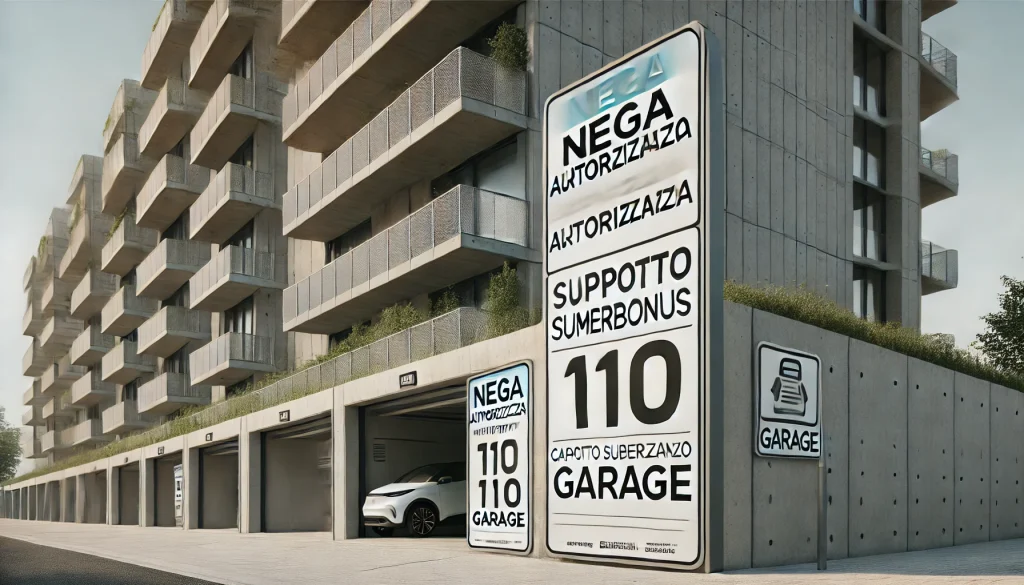The topic of nega autorizzazione cappotto superbonus 110 garage is vital for homeowners interested in energy-efficient improvements for their garages under Italy’s Superbonus 110% initiative. This incentive provides substantial support for insulating garages, yet the challenge of denied authorization nega autorizzazione can impact eligibility.
Navigating a nega autorizzazione can complicate access to Superbonus benefits, especially for garage insulation cappotto. Understanding the steps and implications of this process is essential for those aiming to maximize energy savings and incentives without unnecessary delays.
What is “Nega Autorizzazione Cappotto Superbonus 110 Garage”?
The term “nega autorizzazione cappotto superbonus 110 garage” specifically refers to cases where the application to insulate a garage under Italy’s Superbonus 110% incentive is denied. This can be a common scenario for homeowners aiming to improve energy efficiency through “cappotto,” or insulation, but who face obstacles when trying to obtain necessary authorization.
In Italy, Superbonus 110% covers significant expenses for energy-efficient upgrades, but a “nega autorizzazione cappotto superbonus 110 garage” situation indicates that the proposed insulation work cannot proceed due to lack of official approval. This restriction can affect the feasibility of insulation projects, especially for garages.
A “nega autorizzazione cappotto superbonus 110 garage” may arise for various reasons, including the garage’s location, zoning laws, or structural limitations. In historic areas, for instance, buildings often have preservation requirements that make it harder to secure authorization for insulation.
For any “nega autorizzazione cappotto superbonus 110 garage” case, it’s important for homeowners to fully understand the implications, as it can impact project planning and potential tax incentives. Exploring alternative solutions and understanding local regulations can help in navigating these restrictions.
Key Issues with “Nega Autorizzazione Cappotto Superbonus 110 Garage”
Several issues arise in “nega autorizzazione cappotto superbonus 110 garage” cases, often revolving around building codes, zoning restrictions, and environmental considerations. Local authorities might deny insulation projects if the garage is in a protected or historical area, where building changes are limited.
A “nega autorizzazione cappotto superbonus 110 garage” may also occur because garages are often classified as non-habitable spaces, impacting their eligibility under Superbonus 110%. This classification can complicate matters as it may prevent such spaces from benefiting from insulation upgrades.
Furthermore, structural issues can contribute to a “nega autorizzazione cappotto superbonus 110 garage.” Some garages, especially older ones, may lack the necessary stability to support insulation, which can present safety concerns during the application review process.
- Zoning and Environmental Restrictions: A “nega autorizzazione cappotto superbonus 110 garage” often reflects zoning laws in areas with historical preservation status.
- Non-Habitable Spaces: Garages classified separately from residential spaces may not qualify under Superbonus, leading to a “nega autorizzazione cappotto superbonus 110 garage.”
- Structural Issues: Structural limitations can lead to a “nega autorizzazione cappotto superbonus 110 garage,” especially if the building’s framework cannot support insulation.
These key issues make “nega autorizzazione cappotto superbonus 110 garage” cases complex, requiring homeowners to explore alternatives or adjust their plans in alignment with regulations.
Benefits and Challenges of “Nega Autorizzazione Cappotto Superbonus 110 Garage”
While pursuing insulation under Superbonus 110% has benefits, facing a “nega autorizzazione cappotto superbonus 110 garage” presents challenges that must be addressed. Approved projects improve energy efficiency, enhance comfort, and increase property value, but when authorization is denied, homeowners must navigate setbacks.
In a “nega autorizzazione cappotto superbonus 110 garage” case, insulation projects can experience delays, increased costs, and often require further review from professionals like architects or engineers. This denial can be an opportunity to reassess and modify project plans to align with local regulations.
Although challenging, dealing with a “nega autorizzazione cappotto superbonus 110 garage” can encourage deeper exploration of options, ultimately ensuring that all legal, safety, and compliance issues are addressed in the insulation project.
Balancing the benefits of potential insulation upgrades with the complications of a “nega autorizzazione cappotto superbonus 110 garage” is essential for any homeowner considering energy efficiency improvements for a garage.
How “Nega Autorizzazione Cappotto Superbonus 110 Garage” Affects Your Eligibility
A “nega autorizzazione cappotto superbonus 110 garage” directly affects eligibility for the Superbonus 110% incentive. Without authorization, homeowners lose access to tax deductions and financial support intended to cover project costs, thereby increasing out-of-pocket expenses.
For many homeowners, Superbonus 110% can make energy-efficient insulation projects affordable. However, a “nega autorizzazione cappotto superbonus 110 garage” removes this advantage, potentially leaving homeowners to seek alternative funding sources or scale back their plans.
In some cases, the reasons behind a “nega autorizzazione cappotto superbonus 110 garage” can be addressed by modifying project details or by consulting professionals who can ensure compliance. Occasionally, adjustments to plans may allow homeowners to reapply successfully.
Understanding how a “nega autorizzazione cappotto superbonus 110 garage” impacts eligibility is crucial to prevent setbacks and explore viable options to still achieve energy savings.
Legal Considerations for Garage Insulation Without Authorization
Facing a “nega autorizzazione cappotto superbonus 110 garage” brings several legal considerations. Proceeding with insulation without the required authorization can lead to fines, potential removal orders, and added project costs.
In some circumstances, a “nega autorizzazione cappotto superbonus 110 garage” may still allow for minor improvements under different local regulations. For instance, specific upgrades that don’t impact the structure might be permissible, though it’s critical to consult legal experts.
- Penalty Risks: Insulating a garage despite a “nega autorizzazione cappotto superbonus 110 garage” can result in fines and legal consequences.
- Retroactive Authorization: In some cases, homeowners may seek retroactive approval to address a “nega autorizzazione cappotto superbonus 110 garage,” ensuring compliance and avoiding penalties.
Reviewing the legal aspects of a “nega autorizzazione cappotto superbonus 110 garage” is necessary to minimize risks, protecting homeowners from potential liabilities associated with unauthorized insulation work.
Steps to Take When Authorization is Denied for Garage Insulation
When a “nega autorizzazione cappotto superbonus 110 garage” occurs, taking strategic steps can help homeowners find a way forward. First, reviewing the specific reasons for denial can help clarify what adjustments are needed to potentially gain approval.
Working with qualified professionals, such as architects or engineers, is often essential in cases of “nega autorizzazione cappotto superbonus 110 garage.” These experts can provide guidance on modifying plans to meet compliance standards, which may open the door for reapplication.
If reapplication is not feasible, exploring other energy-saving methods might be necessary for a “nega autorizzazione cappotto superbonus 110 garage.” This could include alternative insulation materials or partial upgrades that meet regulatory standards.
In any “nega autorizzazione cappotto superbonus 110 garage” case, careful planning, professional consultation, and understanding the restrictions are key to finding feasible solutions.
Understanding Superbonus 110 Requirements for Garages
Eligibility for Superbonus 110% requires specific conditions, especially in the context of a “nega autorizzazione cappotto superbonus 110 garage.” Garages should be linked to the main residence to qualify, as non-habitable spaces may not meet Superbonus requirements.
A “nega autorizzazione cappotto superbonus 110 garage” could indicate that energy efficiency standards aren’t fully met, which can affect eligibility. For example, meeting the required energy savings often involves professional assessments to verify compliance with Superbonus standards.
Understanding these requirements can help homeowners prevent a “nega autorizzazione cappotto superbonus 110 garage” by ensuring that the insulation plan aligns with the Superbonus program’s eligibility criteria.
Cost Implications of Insulating Your Garage Under Superbonus 110
In cases of “nega autorizzazione cappotto superbonus 110 garage,” homeowners face increased project costs, as they must cover insulation expenses without the financial assistance Superbonus 110% typically provides.
While the Superbonus program covers a significant portion of renovation costs, a “nega autorizzazione cappotto superbonus 110 garage” can lead to out-of-pocket expenses that would otherwise be reduced by the incentive. Administrative fees, energy audits, and delays also add to the financial strain.
Evaluating costs early on and considering alternative funding sources can help mitigate the impacts of a “nega autorizzazione cappotto superbonus 110 garage.”
Documentation for Claiming Superbonus 110 on Garage Projects
Proper documentation is critical for Superbonus 110% claims, especially when facing a “nega autorizzazione cappotto superbonus 110 garage.” Authorization documents, energy assessments, and compliance records are all required to proceed with a Superbonus application.
If homeowners encounter a “nega autorizzazione cappotto superbonus 110 garage,” the lack of proper documentation can jeopardize eligibility. Maintaining detailed records from the beginning ensures that claims are robust and that homeowners are prepared for any audits or compliance reviews.
A “nega autorizzazione cappotto superbonus 110 garage” scenario emphasizes the importance of thorough documentation, as missing information can be grounds for ineligibility.
Future of Superbonus 110 for Garage Insulation Projects Without Authorization
The future of “nega autorizzazione cappotto superbonus 110 garage” could change as Italy’s Superbonus 110% program evolves. Currently, strict authorization is required for garage insulation projects to qualify for Superbonus incentives. However, as energy efficiency becomes a national priority, there may be adjustments to these requirements that make it easier for homeowners to include garages in their projects, even if full authorization is challenging to obtain.
If eligibility criteria for Superbonus 110% are relaxed in the future, the “nega autorizzazione cappotto superbonus 110 garage” situation may become less of a barrier. Many advocates are pushing for broader accessibility, recognizing that garages can contribute significantly to energy efficiency goals. Such changes could allow more homeowners to pursue energy upgrades, even in areas where authorization for insulation has traditionally been difficult to secure.
For now, those affected by a “nega autorizzazione cappotto superbonus 110 garage” should stay informed about policy updates. Monitoring changes to Superbonus eligibility requirements can help homeowners plan future projects that align with any new guidelines, potentially allowing previously ineligible garage insulation projects to qualify for funding in the future.
The Last Word on Nega Autorizzazione Cappotto Superbonus 110 Garage
In summary, “nega autorizzazione cappotto superbonus 110 garage” represents a challenging yet common situation for homeowners aiming to enhance energy efficiency through garage insulation under Italy’s Superbonus 110% incentive. When authorization is denied, it limits access to funding, requiring individuals to explore alternative solutions or re-evaluate their renovation plans. Navigating this process demands a thorough understanding of local building codes and Superbonus eligibility criteria.
Facing a “nega autorizzazione cappotto superbonus 110 garage” doesn’t necessarily mean the end of an insulation project. Many homeowners successfully work with experts to adjust their proposals, seek retroactive permissions, or even find alternative methods for energy savings that comply with regulations. Staying informed on policy updates and consulting professionals can provide valuable guidance for those affected by authorization challenges.
For those committed to improving energy efficiency, the obstacles of “nega autorizzazione cappotto superbonus 110 garage” highlight the importance of resilience and flexibility. Whether through modified plans, additional consultations, or awaiting possible program adjustments, homeowners can continue to pursue their energy-saving goals within the framework of Italy’s evolving Superbonus policies.


